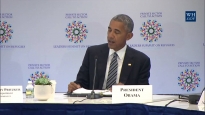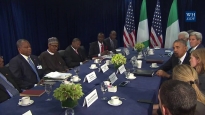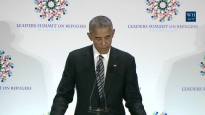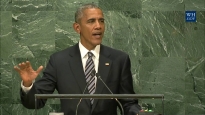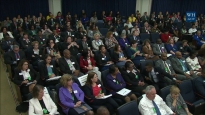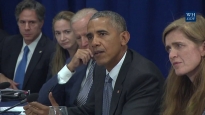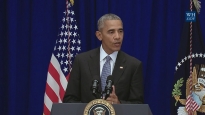President Obama Holds a Press Conference with President Chinchilla
May 03, 2013 | 52:46 | Public Domain
President Obama and President Chinchilla of Costa Rica speak to the press and take questions in San Jose.
Remarks by President Obama and President Chinchilla of Costa Rica in a Joint Press Conference
4:55 P.M. CST
PRESIDENT CHINCHILLA: (As interpreted.) Good afternoon. Good afternoon, dear friends. Dear friends, international journalists and for American and SICA. Thank you very much. Thank you for being here with us this afternoon.
In the first place and before we get any deeper concerning the results of the meetings that we just had recently, in the first place, what I would like to do is to reiterate our warmest welcome on behalf of all the Costa Rican people to President Barack Obama and his delegation. And also I would like to reiterate on behalf of our Costa Ricans the feelings that we feel towards the United States of America.
And I also wanted to thank you very much for the way so cordial and constructive in which we have been able to develop this afternoon’s issues, Mr. President, because I think that we have had very successful conversations in the bilateral meeting. It was my pleasure to report that precisely thanks to this open process of conversations that we have had, it is that we can explore new horizons, always trying to strengthen these traditions based on the essential values that have characterized the relationship between the United States and Costa Rica.
Particularly speaking, I’m talking about values of peace, freedom, democracy, respect to the human rights and the human development. These are the values that we share. And these are the values on which we aspire to continue to develop the relationship between our two nations.
The conversations that we have had have been very useful and they have basically focused on six fundamental issues that reflect this rich diversity that characterizes the relationship between the two nations. We talked about institutional strengthening. We talked about issues of international policy and the involvement, in particular to which Costa Rica aspires in the international economic scenario.
We also talked about the use of fundamental instruments in the relationship of the two nations, like CAFTA, for instance. We talked about an issue that is important but it is not the one that defines our relationship, which is security. And we also talked about a fundamental issue that undoubtedly is going to define the progress and the joint development not only between the United States of America and Costa Rica, but also between the United States and the Central American region, which is the area of energy.
And finally, of course, in our Costa Rican agenda, we included issues having to do with education, entrepreneurship and innovation.
Please allow me to briefly walk you through these six issues so that you can get to know which has been the central element in each of them.
In the area of institutional strengthening, as you know, the government of the United States is promoting what is called the Alliance of Open Government, that basically seeks to strengthen practices that are much more transparent and integral in everything that has to do with the exercise of institutions of public function.
Costa Rica has been an enthusiastic participant in this initiative. We have already proposed our action plan, and we expect to continue to share initiatives, practices, exchanges of experiences on this issue.
In the area of involvement of Costa Rica in the economic global scenario and some of the issues of international policy, we are taking into account -- we have used this session to talk about the involvement of the United States in the area of fire weapons -- and that together they have been able to get the approval in the recent meeting of the United Nations.
Thank you very much, Mr. President, for having sponsored one of the -- that is going to contribute the most to the peace in the world. In addition, I would like to recognize in particular the efforts of President Obama in his own country in order to raise awareness concerning the regulation of fire weapons.
Costa Rica, as some of you already know, is trying to play a more protagonistic role, especially in the area of global development. Costa Rica is a small economy, but it’s a very open economy. It’s a model of success. The accession of global value changes with more and more competitive in the attraction based on high technology. And being a middle-income country, we are a country that is not seeking to get more aid. We basically want to have more opportunities to export what our people are producing.
As we have said in the past, we either export our products the people are able to produce or generate, or we're going to end up exporting our own people. And Costa Rica will continue to keep Costa Ricans in Costa Rica with better opportunities of economic growth and with better opportunities of welfare.
And that is that the aspirations of Costa Rica include to be able to insert itself in the different fora where we will continue to widen the opportunities of trade, investment, and as a consequence, the opportunities to continue to generate employment and welfare in our country.
To this extent, we have talked to President Obama about two important fora where Costa Rica aspires to be present. One is the Trans-Pacific Alliance, the TPP, where the government of the United States and especially the Obama administration is paying an important leadership to the effect of hosting this negotiation. And we would hope that Costa Rica will continue to be the center of attention of the pioneer countries to be able to insert ourselves in the same initiative.
And the other important forum where we have given our best efforts is the forum for the cooperation and development. Costa Rica wants to be there precisely because we want to continue to adopt the best possible practices in matters of development of public policy.
In the area of the using of the CAFTA platform, as you know, this is going to be an issue -- an issue of regional scope. But it has become a bilateral issue to the extent that Costa Rica is one of the economies that has taken advantage of the opportunity provided by the American market. We have become in the SICA framework the most important partner with the United States. Thanks to CAFTA, the countries in our region have increased by 70 percent the international trade. And what we basically seek is to be able to promote initiatives in the area of facilitation of trade.
Concerning the area of security, this, as I mentioned before, is an obligated issue. As you know, Costa Rica considers this a fundamental issue -- has been considering this issue a fundamental one in recent years. We have been able to do well facing common crime. We have been able to reduce the homicide rates significantly. We have been able to reduce the rates of violent crime, thanks to an integral approach in the area of prevention and sanction, as well as the issues having to do with control. But we also have to admit that the issue of organized crime continues to be important on the institution of stability and the integrity of our nations.
Thus, we talked about this issue. We had a conversation about it. We reiterated the importance of keeping the levels of cooperation that we have had so far. But very particularly, we made the point on the efforts that are being displayed by the SICA countries as well as the United States government with the purpose of approaching the issue of organized crime and drug smuggling from a much more integral approach, a much more diverse approach -- not only through the instruments of war, thinking that we're going to be able to overcome this evil. A country like Costa Rica cannot go, of course, to war, but we have to take very seriously the strengthening of those mechanisms and those policies that would allow to prevent the entity of organized crime in our country.
And in that sense, we are deliberating the efforts that we might be able to continue on doing in the matter of prevention of consumption with the matter of more opportunities for the younger community of our country on the subject of strengthening the law, of judicial independence, of free press that might be able to carry out the necessary investigations and the accusations without having on them any effect or threat.
The fifth point of the agenda was a subject regarding energy. It is well-known also for Costa Rica the energy subject has been a value from the point of view of its sustainable development. Ninety percent of the energy that we consume comes from renewable sources. Nevertheless, Costa Rica, as well as the rest of Central America, have a very big challenge ahead of them from the point of view of the cost of this energy. If we do not solve this in the short, midterm, this will have a tremendous weight on the level of competivity [sic] of our region.
Therefore, we have explored with President Obama the possibilities of using the platform of CAFTA so that in the future and once the government of the United States resolves some of the internal discussions that it might have, to be able to enjoy some preferences in regard to the import of natural gas, natural liquefied gas, a source of energy to which the government of President Obama has put a lot of emphasis on.
We have also commented about the efforts that we are developing here in Costa Rica with the purpose of promoting a group of new energies, especially the energies based on hydrogen, and the initiatives that have already been working on by the private enterprises both in North America and Costa Rica with the cooperation of the public sector of Costa Rica, to take them into consideration as part of the initiatives that he has promoted in the framework of the Alliance of the Americas for the energy and for the climate change.
And I finish by talking about the subject of the partnership of innovation and of the education that has such elements of further development. For Costa Rica, education has been a constant in its historical development. As I was telling President Obama, we were born as one of the poorest provinces of the colony, and we have become little by little a nation with great opportunities in the subject of economic development and of well-being for the people, and a fundamental factor, an essential factor has been precisely education.
Much before many other nations of the world, Costa Rica decreed the free and mandatory access to education. And now we dedicate 7 percent of our GDP to finance the public education, and we need, above all, to face the challenge of the reallocation of this education to the demands of the new economy to which we are aspiring to move our country.
In that sense, we have called upon the attention in regard to the possibility of using with greater intensity the very beautiful program that has been characterized by the international policy of the United States, which is the Peace Corps, so that through them, we might be able to improve even more. They have programs of bilingualism that Costa Rica, for 15 or 20 years we have already been introducing in our public education.
We believe that through Peace Corps we can achieve training programs with our teachers, with our professors, our English professors, so that that English is a more proficient English, more competitive, with greater quality and bound precisely through the aspirations of attracting investments and generation of employment that we are working on.
Finally, also we have called President Obama’s attention to the fact that there is nothing more valuable, that there is nothing more important than anybody to get to know a society from the inside. I am a true example precisely of the benefits of scholarship programs that the United States in the past have offered the Central American region. As a matter of fact, that is why we have -- so that we can continue on promoting those scholarship programs and intensify them so that the youth of the Central American region and, of course, of my country can continue on also knowing or competing not only for knowledge of the best universities, of the quality of education of the United States, but also the values that have characterized this great nation.
So thank you very much. President Obama. (Applause.)
PRESIDENT OBAMA: Buenas tardes. Thank you so much, President Chinchilla, for your kind words and for welcoming me here today. This is my first visit to Costa Rica. And even though it is a brief one, I can already tell the incredible spirit of the people, the natural beauty of the country. I understand that the official slogan for those who are thinking about visiting Costa Rica is “un pais sin ingredientes artificiales.” So there’s nothing artificial about Costa Rica. Everything is genuine. And that's certainly true about the friendship between our two countries.
And President Chinchilla has been so gracious in her hospitality. We are very grateful to her. I want to thank publicly the wonderful schoolchildren who sang for us. And I noticed that, Madam President, you and I didn’t sing. We didn’t trust our voices. (Laughter.) But we certainly enjoyed the spirit that those children delivered.
In the United States, we are so grateful for the contributions that Costa Ricans make to our country every day. You welcome many Americans as tourists, eco-tourists, and many others who have chosen to make Costa Rica a new home. This year we’re also marking the 50th anniversary of the Peace Corps here, including President John F. Kennedy’s visit to Costa Rica and his vision for partnerships that advance development and democracy in the Americas.
I had actually a chance during the bilateral meeting to see a photograph of President Kennedy at the same table that we were meeting at -- it had been specially commissioned. And so it shows the longstanding ties between our two countries.
And I’m here because Costa Rica is a great partner not just regionally, but globally. Given Costa Rica’s proud democratic traditions, we stand up together for democracy and justice and human rights in Central America and across the hemisphere. And I want to commend Costa Rica for your landmark law against the scourge of human trafficking. I’m proud to be here as you host World Press Freedom Day. So everybody from the American press corps, you should thank the people of Costa Rica for celebrating free speech and an independent press as essential pillars of our democracy.
Costa Rica shows the benefits of trade that is free and fair. Over the last few years, under the Central America Free Trade Agreement, our trade with Costa Rica has doubled, creating more jobs for people in both of our countries. Our partnerships are creating more opportunities for small businesses and entrepreneurs, including young people and women. As I told President Chinchilla, the United States will continue to be your partner as Costa Rica modernizes its economy so that you’re attracting more investment and creating even more trade and more jobs.
Costa Rica, of course, has long been a leader in sustainable development that protects the environment. The President and I agreed to continue deepening our clean energy partnerships. For example, we’re moving ahead with our regional effort to ensure universal access to clean, affordable, sustainable electricity for the people of the Americas, including Costa Ricans. And this is also another way that we can meet our shared commitments to address climate change.
The President and I reaffirmed our determination to confront the growing security concerns that have affected many Costa Rican families and communities. And under the Central America Regional Security Initiative, the United States has committed nearly half a billion dollars to helping Costa Rica and its neighbors in this fight. We’re disrupting drug cartels and gangs. We're working to strengthen law enforcement and the judicial system. And we’re addressing the underlying forces that fuel criminality -- with prevention programs for at-risk youth and with economic development that gives young people hope and opportunity.
Meanwhile, as I said in Mexico yesterday, the United States recognizes that we've got responsibilities; that much of the violence in the region is fueled by demand for illegal drugs, including in the United States. So we’re going to keep on pursuing a comprehensive approach not only through law enforcement, but also through education and prevention and treatment that can reduce demand.
And finally, I updated the President on our efforts in the United States to pass comprehensive immigration reform. I know this is of great interest to the entire region, especially those with families in our country. And I’m optimistic that we’re going to achieve reform that reflects our heritage as both a nation of laws and a nation of immigrants -- men and women and children who need to be treated with full dignity and respect.
So, President Chinchilla, thank you so much for your partnership. Thank you and the people of Costa Rica for your hospitality.
I’m told there’s a well-known quote here in Costa Rica -- “Where there is a Costa Rican, wherever it is, there’s liberty.” And in the United States, we’re thankful for the many Costa Ricans who contribute to our prosperity and our liberty. And we’re grateful for Costa Rica’s leadership in this region, as we’ll see again when President Chinchilla hosts tonight’s SICA meeting.
I’d note that our presence at tonight’s meeting with the leaders of Central America and the Dominican Republic is a sign of the importance that the United States places on this region, as well as our commitment to being a steady and strong and reliable partner -- because we believe that no matter where you live, the people of this region deserve security and opportunity and dignity.
So let me, again, say thank you -- and in my best tican -- pura vida. (Laughter and applause.)
So I think we're going to go Costa Rican press first and then I'll call on someone?
Q Good afternoon. Welcome, President Obama. The policy of the United States for Central America on drug smuggling and organized crime -- don't you think, for both Presidents, that the time has come to improve our relationships and go on to an agenda that apart from security, we have the social aspects of education and health?
And my second question would be if we're going to be supporting Costa Rica in subjects that were presented today for the SICA? So, thank you, and welcome.
PRESIDENT OBAMA: Well, thank you very much. First of all, I completely agree with you, and I’ve tried to emphasize this throughout my trip: So much of the focus ends up being on security. And we understand that in the absence of security, it’s very hard to develop. But we also have to recognize that problems like narco-trafficking arise in part when a country is vulnerable because of poverty, because of institutions that are not working for the people, because young people don't see a brighter future ahead.
And so what President Chinchilla and I spoke extensively about are initiatives like education, institution-building and capacity, trying to create greater economic opportunity, because the stronger the economies and the institutions for legitimate -- for individuals who are seeking legitimate careers, the more those are there, then the less powerful these narco-trafficking operations are going to be.
And so not only are we interested in promoting trade and highlighting the already extensive trade that we’re doing, but we also want to see how can we build on the successes to improve education even in our strategies to fight narco-trafficking. We, for example, helped to finance youth centers that can give young people a different vision for their futures. We consider that to be part of our overall effort. So it can't just be law enforcement. It also has to be human development, inclusive economic development. We’ve got to make sure that everybody feels opportunity.
Now, even if a country is doing well, the scourge of drugs and drug trafficking will still be there, and there still needs to be a strong law enforcement component. But we can do better than we’re currently doing. And I know that President Chinchilla is taking a great interest here in Costa Rica around these human development issues.
As far as the issues that you mentioned around international organizations, as I indicated earlier, Costa Rica has shown itself to be a world leader and model around free trade, freedom of the press, democracy, respect for human rights, and that makes it an outstanding candidate for membership in the OECD, for example. And so we will expect that we’ll continue to support Costa Rica in expanding its influence.
We enjoy a great partnership on, for example, regional human rights councils, as well as international human rights efforts. Costa Rica has been a real leader, and we appreciate that. And there’s something very effective when large countries like the United States, smaller countries like Costa Rica share values. We come in together. And I think it’s a great way to make the point that regardless of the country’s size, regardless of the language that it speaks, the idea of certain universal rights that are observed for all people is important. And that's why we value this partnership so much.
PRESIDENT CHINCHILLA: I’m just going to add a couple of comments. And I think that it seems to me that I should start by thanking President Obama for his expressed support to the aspirations of Costa Rica for being a member of OECD. We know that there are tests that we have to comply with, and we know that we will be able to comply with them.
Also, let me add something more precisely -- a comment in regard to the subject of narco traffic, organized crime. We believe that there is not a single doubt that President Obama’s administration -- since his coming to Mexico, and now his visit here in Central America -- brings along an agenda that is trying to redefine those relationships based on a greater diversity.
As has been said, our countries are more than just security and violence and narco traffic. That doesn’t mean that it is not an important problem, but I would like to basically finally add the following. What some other countries for a few years now, with the purpose of trying to review some strategies that fall under the fight against drugs, are based basically on the fact that some of the most immediate experiences we have seen in region are experiences that have had to call upon the extreme fight of the war on drugs. Costa Rica doesn’t have an army. And since we don't want to found an army, we do not want to allow ourselves to come to war scenarios to face drug smuggling or organized crime.
Many times the generals ask me, how has Costa Rica done to face such a big threat when you don't have an army and precisely the countries next to you do have an army? But curiously enough, Costa Rica has demonstrated that we have been more effective and more successful in fighting against these threats precisely without having an army. And where am I going through with this? That what we're looking for, for a while now, is precisely the signals that the Obama administration is sending in the sense that an effective policy for the fight against drugs and narco traffic goes through the strengthening of the institutions -- through prevention, through an open society, a more transparent society, and through a citizenship that is much more aware of the problem.
It seems to me that advancing that direction is precisely advancing in the correct direction.
PRESIDENT OBAMA: All right, Mark Felsenthal, of Reuters.
Q Thank you, Mr. President. Madam President. Mr. President, on Syria, you said yesterday that anything the United States does should make the situation better, not worse. How long are you prepared to wait to determine whether chemical weapons were used? What happens when you make your determination? And will you take your case to the United Nations? And have you ruled out putting U.S. troops on the ground in Syria?
PRESIDENT OBAMA: Well, first all, I emphasized yesterday, so let me re-emphasize -- we’re not waiting. We’re not standing by. We are currently the largest humanitarian donor to deal with the crisis in Syria. We are the largest contributor of nonlethal aid to the opposition. We’ve mobilized 80 countries to support the opposition. We are working to apply every pressure point that we can on Syria, working with our international partners.
And so we are actively engaged on a day-to-day basis to try to deal with this crisis and to restore a Syria that is respectful of the rights and aspirations of the Syrian people.
Now, as I’ve said before, if, in fact, we see strong evidence that we can present and that allows us to say that the Syrian military and the Syrian government is using chemical weapons, then that is a game-changer for us because not only is there the prospect of widespread use of chemical weapons inside of Syria, but there’s the possibility that it lands in the hands of organizations like Hezbollah.
We have evidence that chemical weapons have been used. We don't know when, where, or how they were used. We are initiating on our own to investigate and get a better handle on the facts inside of Syria. We’re also working with the international community and our partners to try to get a better handle on what’s happening, and we’ve already gone to the United Nations to say we want a full-blown investigation inside of Syria -- so far, for unsurprising reasons, President Assad has resisted.
We will stay on this. Now, if, in fact, there’s the kind of systematic use of chemical weapons inside of Syria, we expect that we’re going to get additional further evidence. And at that point, absolutely we will present that to the international community, because I think this is, again, not just an American problem; this is a world problem. There are international rules and protocols and norms and ethics. And when it comes to using chemical weapons, the entire world should be concerned.
Now, in terms of what that means in terms of American action, keep in mind we’re already taking a whole range of actions. We’re going to continue to take a whole range of actions. Separate and apart from the chemical weapon use, we got tens of thousands of people who are being killed inside of Syria and we want to see that stopped -- for humanitarian reasons but also for strategic reasons.
But in terms of any additional steps that we take, it’s going to be based on, number one, the facts on the ground. Number two, it’s going to be based on what’s in the interest of the American people and our national security. And as President of the United States, I’m going to make those decisions based on the best evidence and after careful consultation -- because when we rush into things, when we leap before we look, then not only do we pay a price, but oftentimes we see unintended consequences on the ground. So it’s important for us to do it right. And that's exactly what we’re doing right now.
Q Good afternoon, President Obama. Good afternoon, Madam President. President Obama, 10 years ago you were about to come to the Senate. Well, 10 years have gone and Central America has lost more than 130,000 lives caused by drugs traffic. This has been the sacrifice that the region has had because of this problem. What is the sacrifice that in your four years of government you intend to undertake for this business that feeds on the profit that are produced especially by the consumption in your country? And if the United States also believes that the best option is to use warships to be able to survey or keep a watch on the seas on the joint anti-narcotic drug war?
And, Madam President, you have also expressed the values that the government of Costa Rica has with the government of the United States and your point of view with President Obama, for example, on the subject of the international create of weapons -- fire weapons. You say that President Obama said the time has come to recognize the rights for the homosexual couples of the United States. When is the time going to come for that in Costa Rica?
PRESIDENT OBAMA: Well, I think all of us recognize the pain and hardship that's been caused by drug trafficking and transnational drug cartels here in Central America. There’s a cost obviously in the United States as well. It’s not as if we don't have tragic drug problems throughout the United States. And when you look at poor communities inside of the United States, including communities in my hometown of Chicago, there are young people who are killed every day as part of the drug trade.
So this is not a situation where we do not feel the effects. There are common effects, and there are common responsibilities, which is why it’s so important that we work on this on a regional basis.
Now, since I’ve been President, we’ve put our money where our mouth is. I’ve spent -- my administration has spent approximately $30 billion in reducing drug demand in the United States over the last several years. And we’re actually seeing an impact in terms of reduced demand. But the United States is a big country and a big market, and so progress sometimes is slower than we’d like it to be.
There is obviously a role for law enforcement. I’m not interested in militarizing the struggle against drug trafficking. This is a law enforcement problem. And if we have effective law enforcement cooperation and coordination, and if we build up capacity for countries in Central America, then we can continue to make progress.
But the important thing that I’ve tried to emphasize throughout is that this is a common problem. This is one where we’ll only solve it when we’re working together. It has adverse effects in all of our countries. But -- last point I’d make -- I think it’s very important to make sure that our bilateral relationship and the United States relationship with the region as a whole is not solely defined by this problem. Because when it is, we’re missing all the opportunities that exist out there.
When I got off the plane I was greeted by Dr. Chang, obviously a well-known scientist here who worked at NASA and is working now on developing a whole new vision for clean energy, and he brought along four young people -- these incredibly talented young people who are in their last year of high school here. And all of four of them, thanks to some of the good work of our Ambassador and others, will be attending universities in the United States next fall.
And when you talk to those young people, there’s incredible hope and incredible promise and incredible optimism. And I don't want every story to be about drug traffickers and nobody is writing a story about those four young people and what they represent in terms of the future of Costa Rica and the future of this region.
PRESIDENT CHINCHILLA: Every nation or every society has its own way of evolving towards to the responses that have to be provided to the different demands of the social groups and of the different collectiveness that a country might have.
And when we analyze the evolution of the different nations, we see how some of them have advance a little more accelerated -- to subjects maybe of commitment towards the environment, in subjects, for example, for the control of some important aspects in the subject of protection of human life, like for example, the the subject of the control of fire weapons. And others are advancing furthermore in the recognition of certain rights, among them like the one that you have mentioned, the rights of couples of the same sex.
The important thing, Alvarro, is that we cannot simply pass on or go beyond the rhythm or the evolution of the debates from one nation to another. Each one of the nations has its own rhythm. The important thing here I believe -- and what’s it’s worth here -- is that in Costa Rica the framework precisely of democracy that has characterized us, the debate has to be an open debate, a live debate, an active debate -- a debate like the one that I have in qualifying it that has to take place with the greatest of respect without putting a stigma on the different positions that are brought to the debates that take place in a democracy.
And only the mature, ripened, seasoned debate will end up giving the result that will have to be given where it has to be given, which is inside the parliament. So it seems to me that that is what is important, that the debate in Costa Rica is an open debate, a free debate that has to continue as a debate without restrictions.
That is why I have advocated and restated opportunities in my recent report to the nation that this is a dialogue that has been faced sometimes inconveniently on some positions that take sides. And as long as this is faced in this way, I think that the advancement is going to be very slow. I hope and I trust that the debate might really be a much more balanced, much more mature dialogue without putting stigmas on it, and that this might eventually generate a decision in the Congress of the Republic.
PRESIDENT OBAMA: Okay, last question, Lisa --
Q Thank you, Mr. President. Senator Leahy is pushing for a bill on recognizing same-sex couples as part of the immigration bill. Are you concerned at all that that undermines the success of the package? And given that you made a point throughout your presidency to make clear that you don't think LGTB Americans should be treated any differently, will you sign a bill that will do exactly that?
And for you, Madam President, is there any concern that the more -- that by creating more stringent immigration standards could hamper the ability of Costa Ricans to emigrate to the U.S.? Thanks.
PRESIDENT OBAMA: Lisa, I hope you don't mind, before I answer your question I want to get back to Mark because I realize there was one clause in your question -- sometimes you guys have a lot of clauses in your question -- (laughter) -- that I didn't specifically answer, and I didn't want anybody to extrapolate from that.
You asked about boots on the ground and whether we’ve ruled boots out on the ground in Syria. As a general rule, I don't rule things out as Commander-in-Chief because circumstances change and you want to make sure that I always have the full power of the United States at our disposal to meet American national security interests.
Having said that, I do not foresee a scenario in which boots on the ground in Syria, American boots on the ground in Syria would not only be good for America, but also would be good for Syria. And by the way, when I consult with leaders in the region who are very much interested in seeing President Assad leave office and stabilizing the situation in Syria, they agree with that assessment.
So I just wanted to make sure that my omission there did not turn into a story.
To your question, Lisa, as I’ve indicated, I’ve got four broad criteria for immigration reform. I want to make sure that our border is secure and well regulated, in part so that we can get down to the business of smoothing trade and commerce across our borders and creating jobs in the United States, but also making sure that negative actors aren’t able to penetrate the United States.
Number two, cracking down on employers who are breaking the law. Number three, making sure we’ve got a legal immigration system that works better, smarter, and so what we can continue to attract the best and the brightest to the United States.
And by the way, when it comes to legal immigration, the issue here is not going to be stringency, per se. The issue is do we make the system more rational, more effective, better. If there are smart engineers and young people and scientists and students who are looking to emigrate to the United States from Costa Rica, then we want them to know that we’re a nation of immigrants. But we want to make sure that the legal process is in place so that it’s easier and simpler, but also more effective in managing the legal immigration process.
And finally, that we’ve got a pathway so that the 11 million or so undocumented workers inside the United States are able to pursue a tough, long, difficult, but fair path to legal status and citizenship.
So those are my broad-based criteria. Now, the provision that you’ve discussed that Senator Leahy has talked about is one that I support, and I’ve said in the past that the LGBT community should be treated like everybody else. That's, to me, the essential, core principle behind our founding documents, the idea that we’re all created equal and that we’re equal before the law, and it’s applied fairly to everybody.
And so Senator Leahy may present this provision in committee. It may be presented on the floor. It will be one of many amendments and provisions that are presented, some of which I’ll support, some of which I’ll think are really bad ideas. And I think that the general principle for me is are we advancing, are we improving the immigration system -- because ultimately this is an immigration bill.
And we’ll evaluate the end-product. I think it’s premature for me to start talking about what I will or will not do before I get a final product since the road is going to be long and bumpy before I finally see an actual bill on my desk. But I can tell you I think that the provision is the right thing to do.
I can also tell you that I’m not going to get everything I want in this bill. Republicans are not going to get everything that they want in this bill. But if we keep focused on what our main aim is here -- which is creating a smart, effective immigration system that allows us to be a nation of laws and a nation of immigrants -- then we’re going to be in a position to not only improve our economy and what’s happening inside the United States, we’re going to I think have a much stronger relationship with the region and that's going to help enhance our economy and jobs and our growth over the long term.
And, last point I’ll make, as is true with every bill, if there are things that end up being left out in this bill, or things that I want to take out of a bill, but if it’s meeting those core criteria around a comprehensive immigration bill that I’m looking for, then we go back at it and we fix what’s not there and we continually improve what’s been presented.
I think that this comprehensive immigration bill has the opportunity to do something historic that we have not done in decades. But I don't expect that, after we’re finished with it, that people are going to say, there’s not a single problem that we have with our immigration system, any more than is true after any piece of legislation that we pass.
Well, thank you very much everybody. Muchas gracias.
PRESIDENT CHINCHILLA: Thank you very much. Thank you very much. (Applause.)
END 5:45 P.M. CST
|
September 20, 2016
|
September 20, 2016
|
September 20, 2016
|
September 20, 2016
|
|
September 20, 2016
|
September 19, 2016
|
September 19, 2016
|
September 19, 2016
|
- &lsaquo previous
- …
- 21
- 22
- 23
- 24
- 25
- 26
- 27
- 28
- 29
- …
- next &rsaquo
